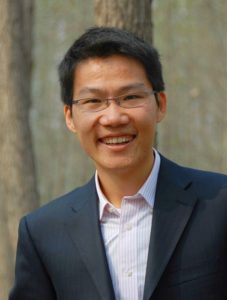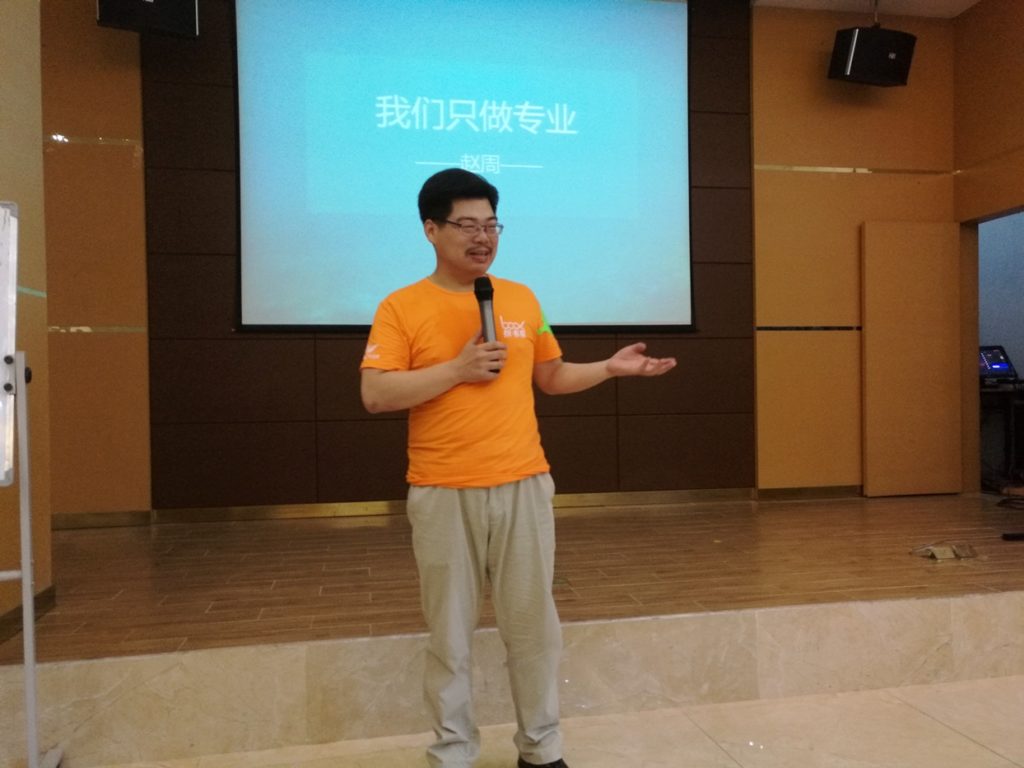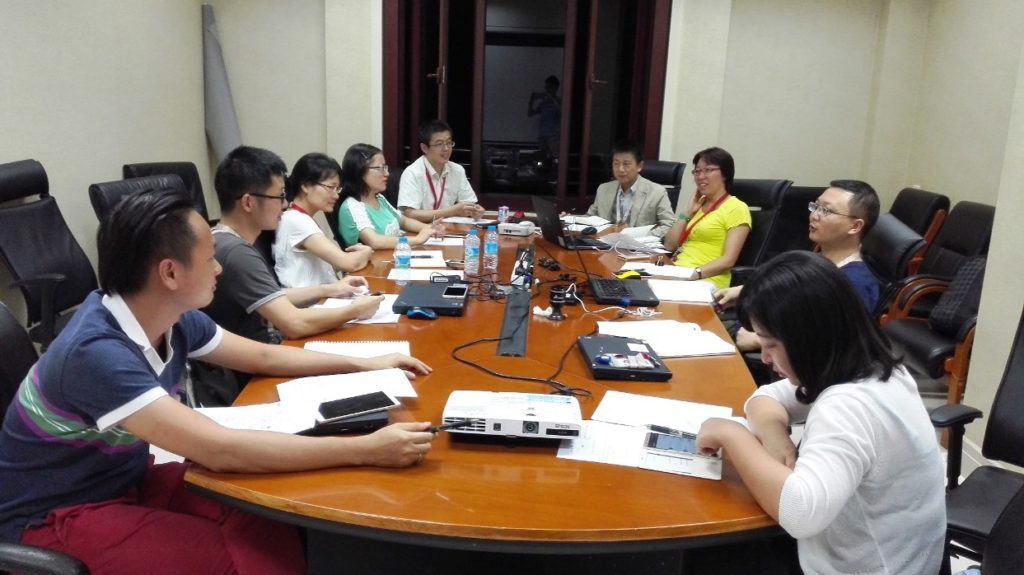The Huawei Break the Book Community is a Reading Group Café – a simple but powerful example of peer learning that has much in keeping with the principles of the Knowledge Café.

In November 2015, I gave a talk at KM Asia (a large annual Knowledge Management conference) on Conversational Leadership in Hong Kong. One of my fellow speakers was Frankie Lai, a Knowledge Manager at Huawei Technologies Co. – the world’s largest telecom equipment and solution provider, based in Shenzhen City, China.
As part of his presentation, Frankie talked about the Huawei Break the Book Community or BBC for short – a form of book discussion club.
I liked the concept so much that I asked if I could interview him by email and document in detail the background and philosophy to the Huawei BBC and how it was run. This is the interview with him that took place in early 2016.
What is the Huawei BBC?
BBC stands for Break the Book Community. “Break the book” does not literally mean “to tear the book apart.” It has two meanings.
1) The BBC is a collective sense-making activity. It consists of three steps (RIA):
Reading (R): You read a book, a newspaper, or watch a TV show or a movie. Any similar input is considered as reading.
Interpretation (I): Having received the input, you make sense of it. In response to the same input, people from different backgrounds will have different understandings. In the BBC we encourage people to use their own words to describe what they have read. At this stage, many people will discover “Wow, others see things so very differently to me!”
Appreciation (A): When people share their understanding, they will naturally share their own stories. These stories are used to explain their understanding. After that, people stop for a while, and think “What have we learned? How are we going to apply that learning to our work and daily life?”
The BBC is a simple process, but it is very effective and has a lot of value.
2) The BBC is a self-development community of practice.
The members of this community are interested in their personal development. Almost all of our members have their own job or business; they are pretty busy.
However, they are eager to learn and so they want to join our regular BBC get-togethers. To most of them, the BBC is a way of life.
Why did you start to run the BBC?
I am not the inventor. Mr. Zhao Zhou invented the method and set up a nation-wide community in China. In 2014, I attended a BBC gathering organized by this community in Shenzhen.
At that time, I was in charge of a “capability development program” which aimed to improve our regional staffs’ capability.
After that first BBC get-together, I decided to introduce the concept to Huawei as I believed it could be of value to us.

What was the problem you were looking to solve?
As I was in charge of the ‘capability improvement program’, I was always asking myself the question: “How can we improve our organizational capability?”
The first idea that jumped to my mind was “training!”. But soon I realized that successful training needed three key factors:
1. Experienced trainers
Trainers need to have good training skills and a good understanding of the business. However, in our organization, most of our business experts do not have any training skills.
2. Highly engaged trainees
In our company, all the trainees are adults, not high school students. The traditional spoon-feeding-style of training would be hard to engage people.
3. High-quality training material
All the trainees have full-time jobs. In the training, they would continually judge the content: Is it useful to me? If they failed to identify the value of the training, they would lose attention.
It would also cost a lot of time and money to develop high-quality training courses.
When I attended the BBC get-together, I realized that I’d found a better way.
When did you start your BBC?
I held our first BBC get-together in Dongguan City on a Wednesday night in April 2014.
Around 15 people joined the get-together; we “broke” a short part of a famous Chinese novel. In English, the story is called “Lala’s Promotion.” It tells the story of a young woman named Lala who is promoted from a junior to senior manager.
The evening was very successful.
The participants liked it because they heard many vivid stories from each other, and they learned a great deal from it.
How frequently do you hold your get-togethers?
After the trial, I was convinced the BBC could be of value to us. So I formed our own self-development community.
This community is not official. So I asked the members how often they would like to meet? They agreed to meet bi-weekly.
So from that date on, most of the time, we hold a BBC get-together every other week.
How many times have you held them so far?
Our community get-together in Dongguan was so good that many members shared their good feelings with their colleagues in other offices.
Soon people from other city offices asked: “Why don’t we create a BBC here?”
So we set up BBC communities in Shenzhen, Shanghai, Nanjing, Hungary, Dubai and several other locations.
As of 1st March 2016, we have probably run more than 200 BBC events.
What time of day do you run the BBC get-togethers and how long do they last?
Most of our BBC get-togethers are run on weekday evenings, as we don’t want to affect our office business.
Some communities choose to run them on a Wednesday night, as their members think the get-together will “refresh them and give them energy.” Some communities prefer to run it on a Friday evening.
Typically a get-together lasts about 2 hours.
How many people participate in a BBC get-together?
Communication is the key success factor for an effective BBC get-together.
To ensure people can communicate well with each other, we limit the number of participants to 15.
How do the get-togethers work?
A typical BBC gathering consists of the following steps:
Step 1: Welcome and networking (Around 30 minutes, 1 – 2 minutes person)
The BBC host welcomes the participants and asks people to introduce themselves. People are invited to share their name, current position in Huawei, their habits, and one interesting thing which will help others know them in person.
Step 2: Brief introduction to the BBC and the topic ( 5 – 10 minutes)
The host introduces the BBC, what the process is, the facilitator (we call him or her the ‘broker’) and the topic for that gathering.
Step 3: Reading (5 – 10 minutes)
The broker leads the participants through some input, for example, read part of a book, or watch part of a movie or engage in a role-play.
Step 4: Interpretation (30 minutes)
The broker then encourages people to share what they have seen and their understanding of the material.
People share their interpretation and automatically share their own stories in the process to support their understanding.
Step 5: Sharing (10 – 20 minutes)
During this session, the participants are requested to think ‘what they have learned’ and ‘what actions they might take in near future.’ People can share their future actions with each other if they wish.
Step 6: Closing (5 minutes)
A group photo is a must for a proper closing.
I am interested in the role play – could you tell me more?
R-I-A is the structure of the BBC activity.
In the section R-eading, the primary purpose is to let the participants get the idea about the content of that day.
Usually a junior or inexperienced facilitator/‘broker’ will play safe and ask the members to read part of a book or watch part of a movie he or she has selected.
But an experienced facilitator may use other ways to deliver the content.
Engaging the participants in a role-play based on the content is always a better way.
How do people sit?
People typically sit around a table in a circle.

Could you give me a few examples of BBC topics and the materials you have used both books and video?
Example 1: The Seven Habits Of Highly Effective People by Stephen Covey
Example 2: Nonviolent Communication: A Language of Life by Marshall B. Rosenberg
The above two books are very popular in the Huawei BBC as they provide us with materials to break for around 3-5 months each.
Example 3: University of Texas at Austin 2014 Commencement Address – Admiral William H. McRaven
Have you used TED talks?
We haven’t used TED talks in Huawei BBC yet. But we are open to all types of activities, as long as they can help us gain more knowledge and improve ourselves.
Have you used professional articles such as Harvard Business Review articles?
Not yet. But your suggestion is very helpful.
Do people need to do any preparation?
People are not required to prepare anything at all. However, the broker needs to choose a good topic and materials.
He or she needs to identify which part of the materials is good for discussion. For example, when a broker decides to ‘break’ a movie, he or she needs to watch the movie 2-3 times to locate the suitable parts of that movie for discussion.
Are there any significant differences between the way that Mr, Zha0 Zhou runs his BBC gatherings and the way that you run them in Huawei?
The BBC in Huawei is a little different from the BBC outside Huawei. They focus more on individual improvement, so each BBC activity is highly dependent on the facilitator. Members are required to share based on the topic, and the topic lead may not be changed.
For example, if the topic lead is on time management, then everyone is focused on time management. But in Huawei, I encourage people to share whatever they want, as long as people think it is useful.
I love this kind of ‘unexpected exchange’.
What has been people’s feedback been so far?
People love the communities. Every time, they can have a wonderful moment when they can get to know more people and listen to real stories, most importantly, they learned something that can be applied to their work and life immediately.
What has gone well?
The BBC has hugely exceeded my expectations in Huawei. Even without any support from the management, we now have many BBC communities in different cities. This simple but useful process is easy to copy in almost all types of organization.
What has not gone so well?
Most of the people when they hear the name of ‘Break the book,’ may think it is a book club and that it does not relate to their work or life. This is particularly the case of departmental heads or managers, and they may stop people from taking part in such activities.
We are now trying to gather more success stories on how the BBCs are bringing value to the business. We believe that in time, more and more managers will realize their worth.
What have you learned personally?
Select and join a good community is a short-cut to improving ourselves. By joining the BBC and BBC gatherings, I have made a lot of friends whom I may have never got to meet. From these people, I have heard many stories which have helped me to see things from different perspectives.
I am now more confident in doing my job so whenever I face problems, I am now able to look for help from our BBC community.
In a word, I have a much better life because of the BBC.
In conclusion, this is such a powerful, low cost, engaging way of learning I am surprised that more organizations have not adopted the format.
Tweet This
Things Todo
- Why not create your own Reading Group Café like Frankie Lai at Huawei?
POST NAVIGATION
CHAPTER NAVIGATION
Tags: Frankie Lai (2) | Huawei (2) | knowledge cafe (107) | peer learning (8) | personal development (18)
SEARCH
Blook SearchGoogle Web Search
If you enjoy my work and find it valuable, please consider giving me a little support. Your donation will help cover some of my website hosting expenses.
Make a donation

